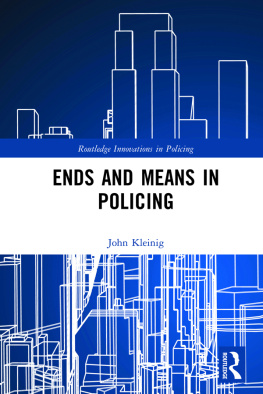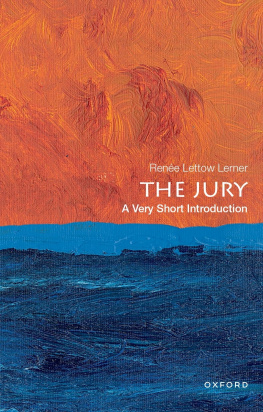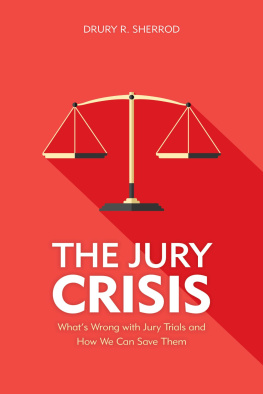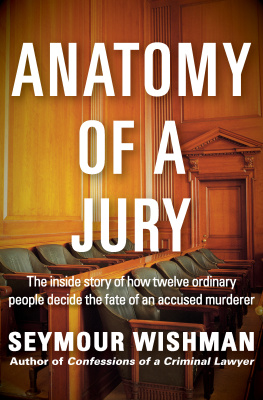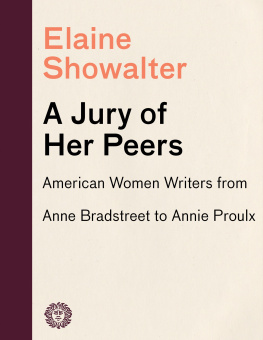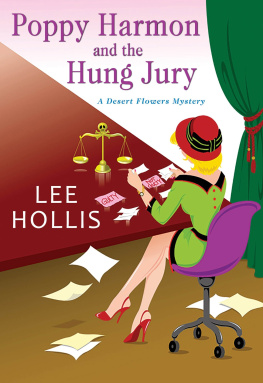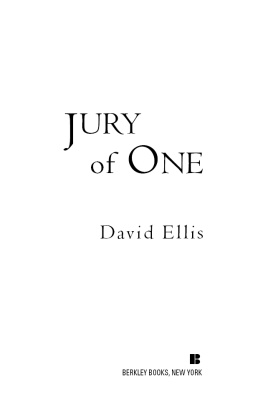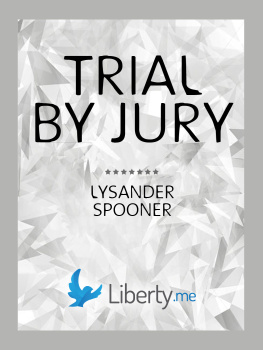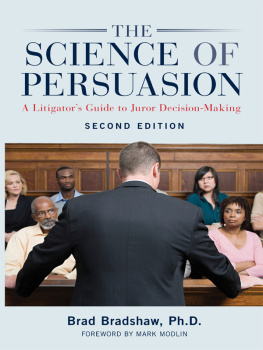Jury Ethics
Jury Ethics
Juror Conduct and Jury Dynamics
Edited by
John Kleinig and James P. Levine
First published 2006 by Paradigm Publishers
Published 2016 by Routledge
2 Park Square, Milton Park, Abingdon, Oxon OX14 4RN
711 Third Avenue, New York, NY 10017, USA
Routledge is an imprint of the Taylor & Francis Group, an informa business
Copyright 2006, Taylor & Francis.
All rights reserved. No part of this book may be reprinted or reproduced or utilised in any form or by any electronic, mechanical, or other means, now known or hereafter invented, including photocopying and recording, or in any information storage or retrieval system, without permission in writing from the publishers.
Notice:
Product or corporate names may be trademarks or registered trademarks, and are used only for identification and explanation without intent to infringe.
Library of Congress Cataloging-in-Publication Data
Jury ethics : juror conduct and jury dynamics / edited by John Kleinig and James P. Levine.
p. cm.
Papers presented at the workshop on jury ethics, held September 12-13, 2003 at John Jay College of Criminal Justice.
Includes bibliographical references and index.
ISBN 1-59451-148-9
1. Jury ethicsUnited States. I. Kleinig, John, 1942- II. Levine, James P.
KF8980.A5J87 2005
347.73'752dc22
2005054455
ISBN 13 : 978-1-59451-148-6 (hbk)
ISBN 13 : 978-1-59451-149-3 (pbk)
Contents
John Kleinig and James P. Levine
Paula Hannaford-Agor and G. Thomas Munsterman
Julie E. Howe
Norman J. Finkel
Adina Schwartz
B. Michael Dann
Shari Seidman Diamond
Alan W. Scheflin
Candace McCoy
Jeffrey Abramson
James P. Levine
Nancy J. King
Neil Vidmar
Valerie P. Hans
Maureen OConnor
This book is about jury ethicsprimarily norms of conduct that jurors are expected to heed as they go about their profoundly important business. Examined superficially, the jurys function in reaching verdicts is a mechanical one devoid of moral choices: they simply apply the law as explained by the judge to the facts revealed by the evidence. The reality is otherwise; their participation in the trial process is fraught with ethical questions that require judgment rather than formulaic processes. Jurors are to a considerable degree driven and constrained by a code of conduct;1 for the most part they must rely on their own consciences in drawing the limits of proper behavior.
From the time a person is summoned for jury service to the end of the trial and beyond, jurors are confronted by a host of moral questions about proper conduct. Jurors must decide whether to try to avoid jury service altogether and what strategies to use should they choose to do so. They must consider how much information about themselves to reveal or withhold during the voir dire process. In reaching a decision about verdicts, jurors sometimes must ponder whether the interests of justice may warrant an acquittal even when the accused appears to be guilty on the basis of facts. Deep-seated matters of conscience almost invariably enter the decision-making crucible when jurors must inflict the death penalty. During deliberations, jurors must think about proper etiquette and decorum in the deliberations process as they try to persuade their co-jurors. And after the verdict is in, they must concern themselves with the sanctity of the discussionwhether and under what conditions to divulge what transpired in the jury room.
Both trial and appellate courts have been perplexed about the moral contours of jury decision making, as was revealed by an ethical predicament confronting the Colorado Supreme Court in March 2005. Jurors considering whether to sentence a man to death for raping and murdering a cocktail waitress were told by the presiding trial judge to make an individual moral assessment in deciding whether the convicted defendant should live or die. The jurors consulted various passages in the Bible to clarify their thinking, and the resulting death sentence was challenged on appeal on the grounds that such guidance from religious sources represented undue outside influence on the jury. The three to two split on the Colorado Supreme Court keenly illustrates the moral conundrums about appropriate jury behavior. The majority, which voted to overturn the verdict, ruled that jurors must deliberate without the reliance on higher authority and without the aid or distraction of extraneous texts. The minority vehemently disagreed, claiming that the biblical passages the jurors discussed constituted either a part of the jurors moral and religious precepts or their general knowledge and thus were relevant to their court-sanctioned moral assessment.2 If the highest court of a state is so divided about the limits of proper jury behavior, one can only imagine the confusion in the mind-set of jurors who lack the jurisprudential grounding of judges and who are often at sea about what conduct is permissible.
Several of these ethical dilemmas came to light in a New York Times investigation of jury behavior in the case of those accused of the 1998 terrorist bombing of the American embassies in Tanzania and Kenya in which 224 were left dead.3 Four men were accused of the crime, and the federal government asked for the death penalty for two of them. All four were convicted, but the request for execution requiring unanimity among the jurors was denied by the jury, which split nine to three in favor of capital punishment.
One of the jurors who voted against the death sentence later revealed to reporters that he was vehemently against the death penalty despite having said during the pre-trial screening that he had an open mind and that the propriety of imposing death depends on the occasion. His obstinance was all the more glaring given the fact that when asked on a pre-trial questionnaire to rank his views on capital punishment from 1, strongly oppose, to 10, strongly favor, he circled 6. Query: Was it legitimate for this juror to be less than forthright when questioned about his beliefs before the trial in order to get on the jury and prevent what he thought was an unconscionable outcome?4
Another matter of controversy revolved around jurors seeking spiritual guidance. Despite the fact that the judge had instructed jurors not to communicate with anyone about the trial, two of the jurors consulted their pastors during the deliberation process to get advice on whether the scriptures permitted execution. Although these jurors had initially said they could vote for capital punishment, when confronted with the actual decision to impose death they felt compelled to get reassurance that they would not be violating any religious proscriptions. Both were ultimately part of the majority opting for the death penalty, having been reassured that such an action was morally sound. Query: Is it wrong for jurors to get clarification on their beliefs before agreeing to a decision that would terminate someones life?
Yet another juror confessed that he considered the possible ramifications of executing the terrorists. He wound up voting to spare the defendants partially on the grounds that an execution would be provocative, perhaps inciting another attack again the United States. Also worthy of note was his expressed concern for his own personal safety as the only Jew on the jury should the verdict be for death; he was not convinced that the anonymity of the jury would prevent his identity from being discovered. Query: Is it


